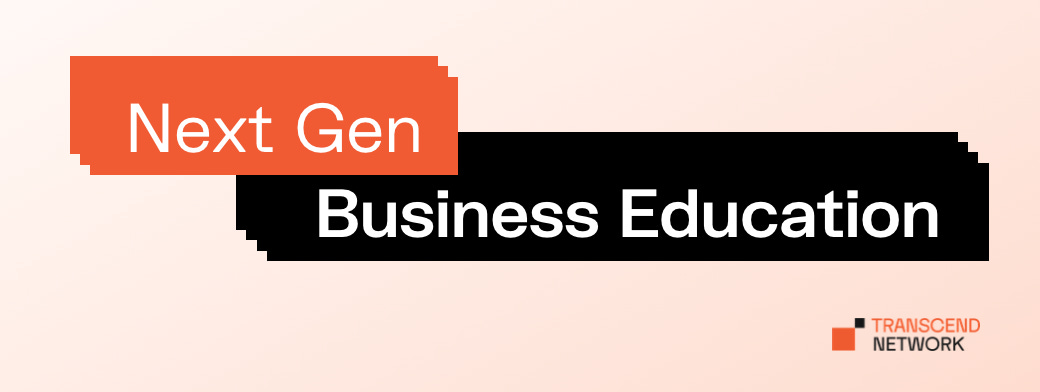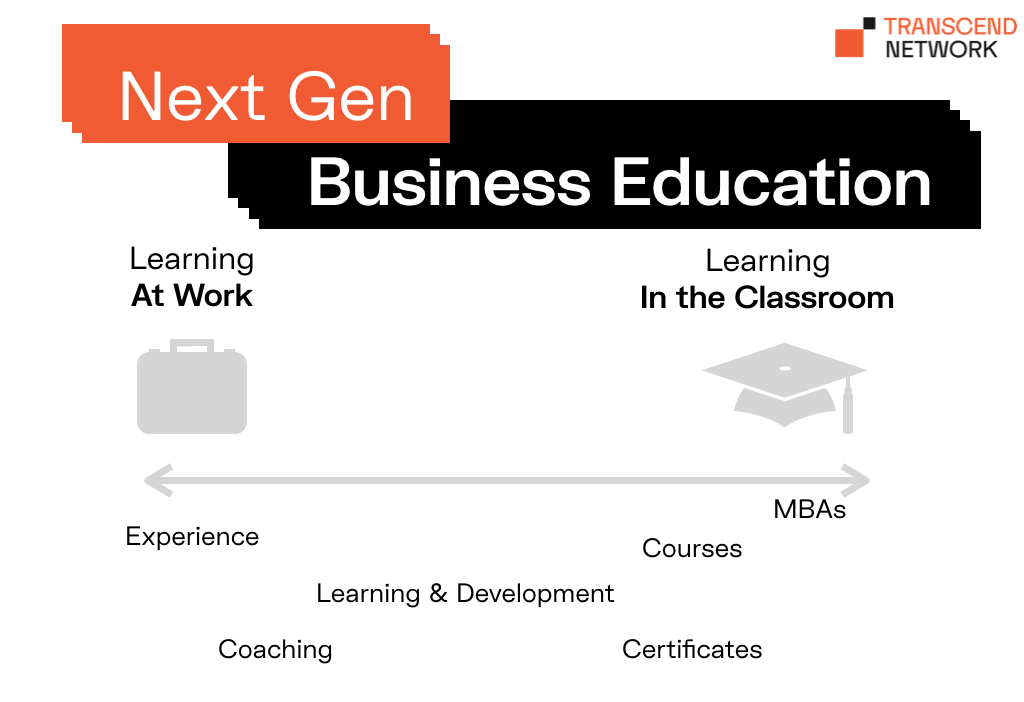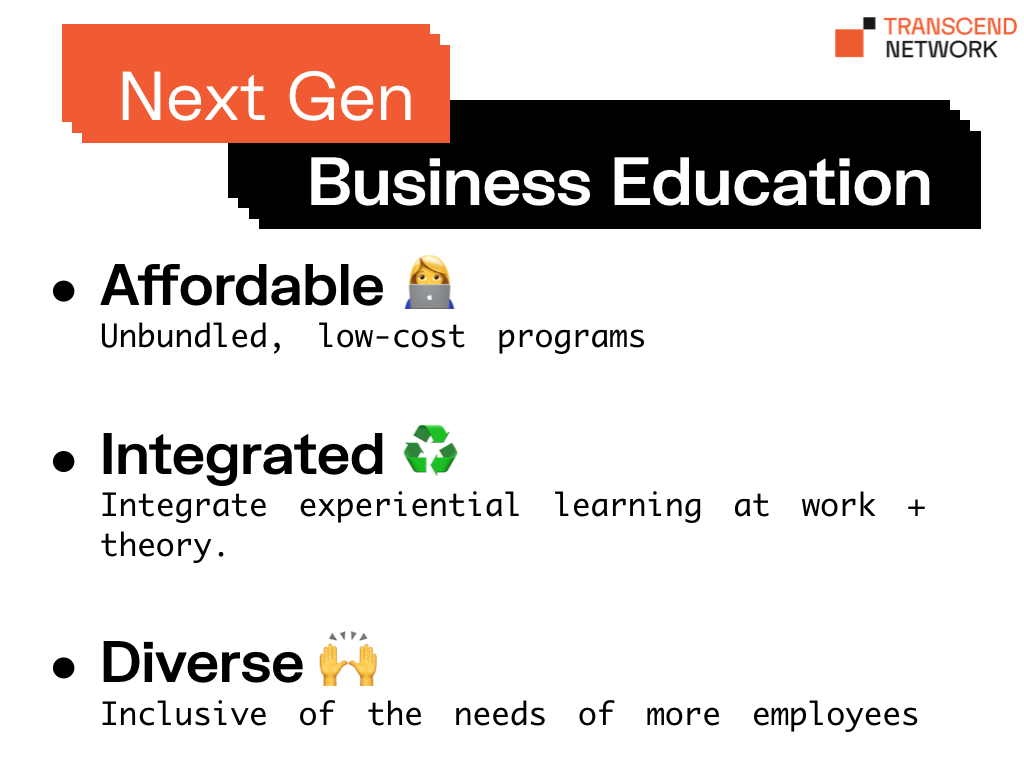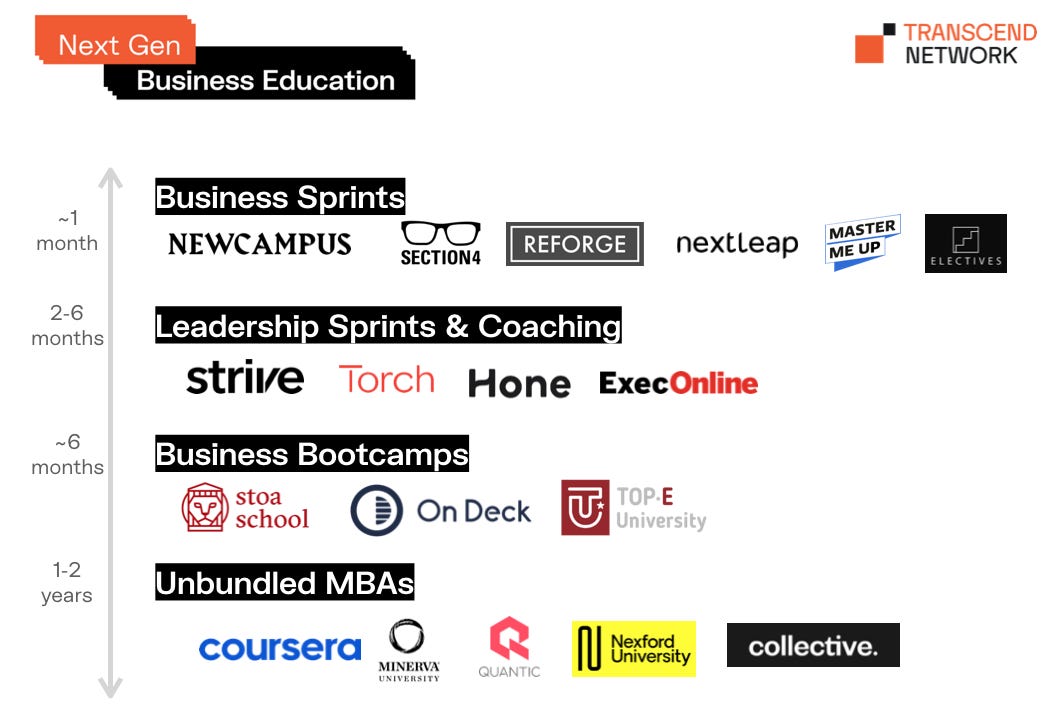Next Gen Business Education 📊 Transcend Newsletter #46
The new wave of startups taking on the MBA, and our new Exploration Lab!
Hola! Alberto here. Welcome to the Transcend Newsletter.
The Transcend Newsletter explores the intersection of the future of education and the future work, and the founders building it around the world.
We welcome 74 new readers since our last newsletter! If you have a friend who is interested in new ways of learning about business and careers, hit the ❤️ button and share the Transcend Newsletter with them!
Quick announcement before we start ⚠️
Do you have a startup idea? We just launched the Exploration Lab, a cohort-based experience to help aspiring founders make their startup ideas a reality – we’ll help you launch your startup in the future of learning and work! Applications close this Friday Aug 27th, feel free to join our info session on Thursday or reply to this email to learn more about it!
This week’s newsletter is about the next generation of business education startups. Read on to learn more about:
What business education looks like today
Next gen startups focusing on low-cost alternatives
The market landscape and open questions
Enjoy!
Business education is simple: it teaches the skills needed to make businesses work better.
But accessing business education isn't quite as simple. It has historically been very expensive.
Today, we are seeing a massive shift towards more affordable and hybrid experiences of business education: next-gen business education.
We think this is pretty cool, so let's talk about it!
What is Business Education?
Business education has proven to make both companies and employees better off. More and more, it's becoming central to the social contract between firms and workers: 94% of Millennials and Gen-Z employees would stay longer at a company if it invested more in their development.
But historically, only the top of the company hierarchy (executives and managers) would get access to business education, through expensive MBAs or coaching programs. This is about to change, as we'll see below.
Business education covers the skills needed to make businesses work better. These can be directly related to the business (finances, product, operations, marketing, strategy) or related to the team that's building it (management, hiring, diversity & inclusion). The skills are learned mostly through two channels: at work and in the classroom.
Most employees learn about business at work, whether it is done intentionally through coaching, Learning & Development programs, education benefits, or as a side-product of the work experience. Learning at work teaches you job-relevant skills, but it is hard to find enough time for it: employees only have 24 minutes a week to learn.
Others learn in the classroom, through a Master in Business Administration (MBA), a certificate, or an Executive MBA. These experiences can be a lot more intensive (as often these programs require a full-time focus), but they also can be less connected to the skills needed at work.
The costly status quo
Getting access to business education has been historically costly, and as a result, only a few employees (mostly managers and executives) would benefit from the highest-quality programs.
The most common way to do so was through an MBA. MBAs are costly: in the US, MBA programs can cost up to $200K in tuition and living expenses. Business schools in Europe can go up to $100K. In India, IIM's Masters programs can cost between $20-40K.
Online MBAs have a lower delivery cost: the iMBA, an innovative masters program run by the University of Illinois Urbana-Champaign in partnership with Coursera, is radically cheaper than the competition, and yet it still costs north of $20k. Even the least selective MBA in the US (online masters at KU) costs north of $36K, despite having a 96% acceptance rate.
There is plenty of evidence showing the positive results of business education on company performance and employees' salaries – how can we get 10x more people to benefit from it this decade?
The Next Gen of business education
The key will be to build high-quality business education alternatives at a low cost.
The momentum for change has already started: business education is already trickling through the org structure as prices decrease. More employees are consuming content around business (podcasts, creators, shows) and taking courses out of their own pocket. As business education spreads all the way down the company, it takes on more diverse forms than just an MBA!
The next-gen business education we have seen so far have three pillars to their thesis: Affordable, Integrated, Diverse (AID):
Affordable: instead of paying for a "bundled" product (that includes many different programs and services), employees will be able to pay for individual, hybrid experiences offered at a low price point.
Integrated: we know from years of research that learning through experience is not enough – it requires further reflecting and contextualization to make it stick. Effective experiences bridge learning at work and in the classroom.
Diverse: traditional business education has been offered to a small subset of employees – as more employees get to participate in it, the form of those programs will take on more diverse forms, voices, and experiences. And they are very social!
The landscape today
We break down the business education market by the length of its programs, from one-month sprints (an emerging term for intensive cohort-based courses) to multi-year masters:
Business Sprints (~1 month): short-term learning programs around key business skills in a cohort environment. They often have a membership option to stay connected as alumni. Examples include NewCampus, Section 4, Reforge, MasterMeUp, NextLeap or Electives. We see this is the fastest-growing sector today.
Leadership Sprints & Coaching (2-6 months): these programs target managers and leaders and are more intensive than sprints, as they often add coaching, such as Strive/Franklin Covey, Torch, ExecOnline, or Hone.
Business Bootcamps (~6 months): emerging as an alternative to the MBA, these are longer than sprints but shorter than MBAs, such as Stoa School, OnDeck or Top-e.
Unbundled MBAs (1-2 years): fully accredited MBA programs that by design are more affordable and unbundled, such as the Coursera iMBA (which enrolled 6,000 students last year and shut down their in-person program), Minerva's Masters in Decision Analysis, Nexford, Quantic, or Collective Academy.
We think these companies and schools are just scratching the surface of the opportunity here.
One of the biggest shifts will be connecting the consumer-led models of business education (Maven, OnDeck, creators) to the enterprise budgets of Learning & Development, which is a massive $65b industry.
We expect to see employees take more control over their learning at their companies, which will involve employers allocating more money to learning benefits vs structured learning & development programs.
What's next for Business Education?
I always interview sector experts before writing the newsletter. This time I didn't. There were a lot of open questions such as:
Will business education grow by partnering with employers or going direct to consumer?
Is there a tradeoff between cost and quality in using cohorts vs self-paced content for learning?
What key business functions are still underserved when it comes to business education?
My goal was to put something out there that sparked a constructive conversation after publishing the piece, and that’s what we’ll do!
Next Thursday, September 2nd, we'll be hosting an open discussion with leading founders and investors in the business education space to discuss these open questions, and it will be open to everyone – we'll slowly announce the speakers through next week 👀
news roundup around the future of learning and work
💻 The Big Blur report explores the opportunities to do away with schooling labels and serve 16-20 year old with high-demand skills.
👩💻 Nesta published a fascinating report on the use of edtech tools during the pandemic
📖 “Why books don’t work” provides arguments against “transmissionist” views of learning, in favor of more learner-centric models.
🔍 If you want to learn more about our Exploration Lab or are exploring ideas to launch your startup, join us on Thursday for our second Info Session about the program!
exciting job opportunities we want to share with you!
For more job opportunities, check out our full Job Board!.
Did you enjoy reading this piece?
Hit the ❤️ button to help us reach more awesome people like you!







Great piece as always Alberto! I wonder if an even more radical notion may come in to play. What I'm seeing at places like Maven is that cohort based courses give you the network and academic component of a business school, micro-targeted at your need, and delivered by high-influence folks you know (authors, twitter gods, etc) It feels like we may see a disaggregation of business school, followed by a re-aggregation at the employer level. That re-aggregation feels like a stretch for a Guild or degreed, so may be another great market opening.